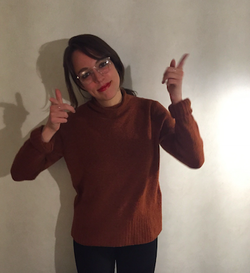
Hi, I'm Becca. I am the non-fiction book critic of the Washington Post, an editor at The Point, and a contributing editor at The Boston Review . My essay collection, All Things Are Too Small, was published Metropolitan Books in the US and Virago in the UK in April 2024. The New York Times called it "splendidly immodest" and "exhilarating" and The Guardian called it "bracing and brilliant." It was a New York Times editors' pick and a New Yorker weekly recommendation. Finally, I am also a PhD candidate (on indefinite hiatus) in philosophy at Harvard, but i remain perhaps delusionally convinced that someday I will finish my dissertation. These days I live in Washington, DC, with this person, whom I love. Here you can find all of my Washington Post pieces, which will come out each week, generally speaking.
To keep up with my writing/rantings, subscribe to my substack here. As a writer: I have contributed essays, book reviews, and the occasional art review to publications like The TLS, The Nation, The New York Times Book Review, The New Yorker, The Atlantic, Liberties, Bookforum, Art in America, The Yale Review, The Baffler, and more. These days, I write mostly for the Washington Post about non-fiction, but occasionally I write essays on fiction and whatever else for other venues. I am the winner of the first annual Robert B. Silvers Prize for Literary Criticism (see more here) and the 2023 Nona Balakian Citation for Excellence in Reviewing (see more here). In 2017, I was a finalist for a National Magazine Award in the essays/criticism category. A few authors I especially love are Joseph Roth, Italo Svevo, Henry James, Henry Green, Heinrich von Kleist, Marie de France, and Norman Rush. My agent is Anna Sproul-Latimer of Neon Literary. As a (lapsed?) philosopher: I am primarily interested in aesthetics (especially aesthetic value and its relationship to other types of value), the philosophy of love and sex, and the history of German philosophy, especially Martin Heidegger, although I have increasingly consuming secondary interests in political philosophy. In "The Good, the Bad, and the Ugly," published in The British Journal of Aesthetics, I defend aestheticism, the view that aesthetic value is sometimes a partial grounds of moral value. I describe aestheticism in more detail in a chapter in the Oxford Handbook of Ethics and Art. If I ever get around to completing it, my dissertation will be about some combination of the following: what it is to be a beautiful person, why evolutionary psychologists are wrong about human beauty, the ethics of exclusionary romantic/sexual/aesthetic preferences, and what role the state should play in ameliorating inequitable distributions of intimate "goods." I hold a first-class MPhil in the history and philosophy of science from the University of Cambridge and a B.A., summa cum laude with high honors, from Dartmouth College, where I studied philosophy & German (and cultivated an enduring distaste for fraternities). I receive many emails asking for advice about graduate school applications. I have answered some frequently asked questions on this page. As I note there, I do not consider myself an expert in how to write a successful graduate school application, and I urge all prospective grad students to consult resources online, as well as supervisors who have served on admissions committees, rather than me! Before the pandemic, I followed Hegel in regarding nature as geistlos, but now, like any good Heideggerian, I am a big fan of hiking. Here I am in the Berkshires, which I love
|
|
When do writers find the time to do any actual writing? It sometimes seems as though they are always speaking — delivering lectures, pontificating in bookshops, opining on talk shows. If they are lucky enough to win awards, they clear their throats and make grateful remarks; when the books they have somehow secreted between their speaking engagements are at last released, they discuss their “inspirations” and their “process” on podcasts or radio shows. More and more, the life of a professional author involves not writing but talking.
Of course, most people talk all the time and think nothing of it, life being a regrettably non-epistolary phenomenon. They explain their ailments to their doctors; they chat with their coworkers and complain to (and about) their friends. If they spew a few inelegant or inapt phrases in the course of all this nattering, well, they have no choice but to continue fumbling: conversation does not allow for revision or retraction. Why should writers be exempt from an otherwise universal indignity? They, too, are people, and people speak and misspeak. Still, I have always thought that there is something peculiarly invidious, even offensive, about the expectation that writers talk, at least in their capacity as writers. Read more here.
0 Comments
First affirmative constructive (eight minutes)
the round would open with fumbling, throat-clearing, the tapping of feet or fingers against tables or tubs—those unwieldy plastic bins we filled with research about free-trade agreements or French social theory that I would lug along the corridors of high schools deserted for the weekend. By mid-morning, I’d already be moving in the miasma of competing pungencies: the stink of sour sweat, the scrubbed floors’ bright institutional tang, the greasy reek of the sandwich I had eaten for breakfast. My destination was a classroom rendered thrilling by its foreignness, for I was far from my high school in Washington D.C., perhaps in a state as distant and exotic as Texas or Illinois. Here, with our tubs stacked around us, we would take our places at vacant desks, pens in hand, arranged in teams of two. At last, a spindly figure ensconced in an ill-fitting suit would lurch into eight minutes of declamation. “CONTENTION ONE!” the speaker would gasp, and we were off to the races. Read more here. In response to an essay from Agnes Callard. Here's the complete text (and the link is available here):When I eloped with a man I had known for just two months, I understood my choice by way of analogy with (what else!) literary criticism. In my vows, I quoted Elizabeth Hardwick, who once wrote that “to assert greatness does not give us the key; it is only the lock.” As I told my husband on our wedding day, what I think Hardwick means is that judgment is the beginning, rather than the end, of criticism. The best reviews do not seek to establish whether a book is good or bad—which is almost always readily apparent—but to grapple with the mystery of its goodness or badness. Marriage, I suggested, was similar: falling in love occasions certainty so acute that it is reminiscent of the undeniable pangs of pain, but next comes the more vexing business of parsing a passion and living with its intensities.
Callard suggests that the “erotic crisis” is primarily intellectual: eros “attacks the heart by way of the mind.” In what way is erotic ardor an intellectual affliction? Callard suggests several possibilities. The first is that love changes the texture of thought. The lover transforms into a conspiracy theorist as the beloved’s most innocuous email becomes a constellation of clues, her most trivial gesture a portent. In other words, eros re-enchants the world. The second sense in which erotic passion might be intellectual is that it embroils us in a mad quest for certainty. In love, we want to know what the beloved’s behavior means, and, perhaps more urgently, what our own behavior means. The association of eros with this sort of intellectual problem implies that love is bound up with confusion, and that understanding (or reconciling oneself to a lack thereof) can lead to resolution. Alexander Nehamas believes that a critic’s fixation with a work of art ends only when she gives up on trying to understand it, or when she reaches “full understanding,” and her interest is inevitably “exhausted.” But I’m not sure this is true. What makes love so miraculous is that it enables us to go on wanting something we already possess. Even if I understood my passion for my husband entirely, I would continue to desire him. Eros, then, is not intellectual but aesthetic, which is to say it is appetitive. It is for this reason that metaphors of feeding are irresistible to the lover. Consider Proust’s lovelorn Swann, whose jealous infatuation is “gluttonous of everything that would feed its vitality.” Callard herself writes that “if you try to fight the monster, you just feed it.” Even the most enlightened beasts must eat. Becca Rothfeld Cambridge, Mass. I suspect that most people would rather live in a work of fiction than in reality, but the narrator of Ben Lerner’s 2014 novel, 10:04, fails to appreciate his good fortune. He is lucky enough to find himself in a book by one of the supplest stylists in America, but often, he seems intent on clambering out of art and into life. Not only does he bear such an uncanny resemblance to his non-fictional creator that the two threaten to bleed together, but, on a series of visits to his moribund mentor, he reflects that if he were the one on his deathbed, ‘I wouldn’t even think about literature, would just be asking for morphine and distracting myself, if possible, with reality TV.’
This scene could not contrast more starkly with a strikingly similar sequence in Pure Colour, Sheila Heti’s latest genre-defying effusion. The book’s protagonist, Mira, is tasked with tending to her father in his final weeks, but her loss does not convince her of the frivolity of aesthetics. Instead, ‘it seemed to her the week her father was dying that nothing mattered but art and literature’. Heti’s, whose own father died when she first set to work on the book, is no stranger to the sharp bite of grief, but she is nonetheless unequivocal about beauty’s primacy. Mira’s stifling depression lifts only when she marvels at the Christmas lights in her neighbourhood and becomes ‘choked up with gratitude over all those tiny shining souls that adorned the trees and the falling-down porches’. Read more here. |
Archives
June 2022
Categories |

 RSS Feed
RSS Feed